Advertisement
This boat-loving, Jaguar-driving, government-fighting 84-year-old warrior is retiring this summer. Sort of. Our editors sit down with the founder of BoatUS.
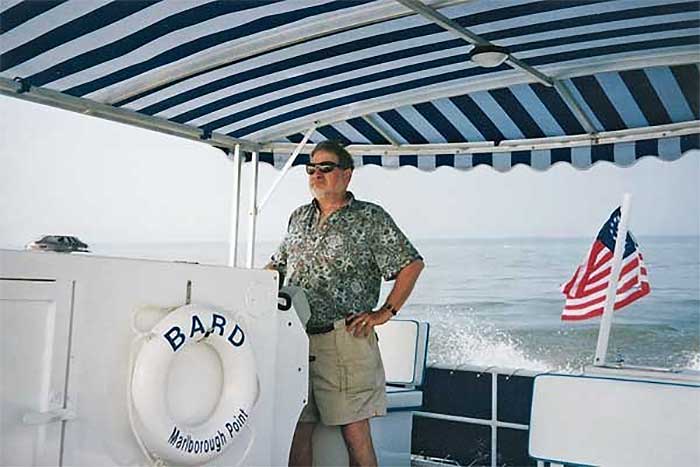
Richard Schwartz, enjoying one of his favorite places on earth.
Within four decades, Richard Schwartz has changed the face of American recreational boating. Through his efforts and those of BoatUS, the membership organization he founded in 1966, boats are built to more stringent safety standards, boaters' rights are defended from coast to coast through the BoatUS Government Affairs office, and boaters who have problems with boat and product manufacturers have an advocate, BoatUS Consumer Protection, that will go to bat for them.
He and his team also created the nonprofit BoatUS Foundation For Boating Safety and Clean Water; BoatUS Marine Insurance, one of the largest and most comprehensive marine-insurance operations in America; TowBoatUS, the on-the-water towing company with over 300 locations and 600 boats all over the U.S.; and BoatUS TRAILER ASSIST, offering unique roadside-assistance service for trailerable boats.
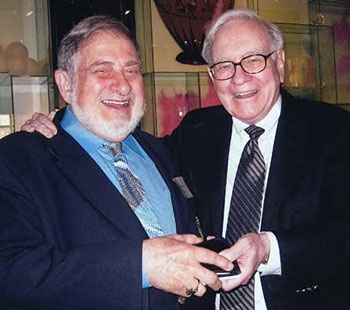
Richard sharing an evening with Warren Buffett of Berkshire
Hathaway.
Richard is 84 now, full of energy, and still as engaged and proud as he was 47 years ago, particularly whenever he meets BoatUS members — at boat shows, in airports, or when he and his family are out on the water. He comes into his office in the BoatUS Alexandria, Virginia, headquarters every weekday, as smartly dressed as ever, a jaunty handkerchief always in his jacket breast pocket. Recently, our BoatUS editors had fun sitting down with him for an intimate conversation, after he made the announcement that he was "retiring."
Richard, tell us about your first boating memory.
I tell people I was born in the bilge of a boat, but I really wasn't. I remember going out in a rowboat in Bronx Park with my dad, little sister, and brother, and loving it. After that, I began looking for friends who owned boats and hitched rides whenever they'd invite me.
You rarely talk about your childhood. What was it like?
I grew up in Mount Vernon, New York. My father had a gas station and tire shop next to a butcher shop owned by an African-American family. Their son Luther was my best friend. I became part of my dad's business as soon as I could pump gas. By the time I was 10, I was the fastest tire changer in town. My dad worked from sunup to sundown while my mother worried mostly about my brother Lenny, who died at 13 from leukemia.
Did your family put a lot of pressure on you?
My dad really wanted me to take over his retail and wholesale tire business, but I wanted to be a lawyer. My best friends and I were top of our class at A.B. Davis High School. Number one went to Harvard, number two to Yale. I went to Princeton, then Yale law school. Another guy in my class became the star millionaire — rock-and-roll magnate Dick Clark. Years later, long after my father died, I had tears in my eyes when we opened the first BoatUS Marine Center. His son had ended up in the retail business after all! I wish he'd seen that.
What's the most important thing you learned from your upbringing?
My dad dropped out of Cooper Union College to support his family, and my uncle Louie delayed marrying for years so he could graduate from college. My dad was kind and loved by everyone. Louie was ironic, steadfast, and manly. Those two men taught me the importance of family and a good education. I learned about entrepreneurship, what success looked like, and how much hard work it took.
How did the concept of starting a boaters' membership organization occur to you?
In 1965, I went out on the Chesapeake with a friend who had just bought a new boat. A short distance from the dock, we were boarded by the Coast Guard, who cited him for having a faulty engine-compartment ventilation system. As a lawyer, I was stunned to discover that boat manufacturers at the time had no liability for meeting government safety regulations, and the Coast Guard had no jurisdiction over the manufacturers to make sure they built a safe boat — because those manufacturers built those boats on land! It made no sense, but the Coast Guard could only enforce safety standards AFTER the boat was in the water. Imagine driving a new car out of the dealer showroom and being ticketed because the emission system was illegal!
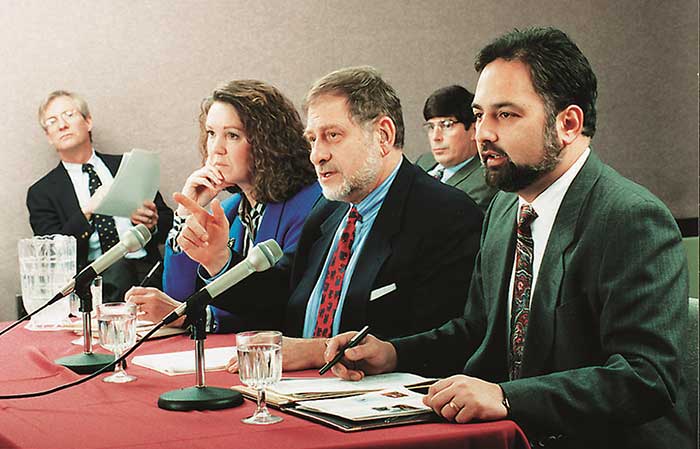
Richard has spent countless hours testifying in Congress on behalf of the recreational boater.
I began investigating and learned it would take congressional legislation to solve. There were two trade associations that represented manufacturers, but no organization represented boat owners to take up the cause. This was an opportunity for a new organization that combined my passion for the law, and the political process. I called it Boat Owners Association of The United States – BoatUS!
BoatUS folks say you love to argue?
Legislative problems don't just solve themselves. You have to present your position again and again, until people in power do something about it. I was on the debate team in college and learned to look at both sides of an issue. You understand a lot more that way, and that really helps when you're trying to change congressional minds. We've been winning for boaters for years, using that approach. If that's arguing, then I guess I do like to argue.
In the early days at BoatUS, you were known as a micromanager, and could be heard all over the building. Now you're the picture of calm. What happened?
I was always worried sick about making payroll and was afraid of failure. I just believed we needed to be perfect to succeed. So I was under a lot of pressure, and erupted when things weren't right. A few things happened that calmed me down. First, BoatUS finally became successful and passed the 100,000-member mark — that took 14 years! Second, I spent eight post-divorce years with my daughters. With a carefully modulated "now, DAD" whenever I needed it, Dianne, Lori, and Pammy reminded me that I didn't need to manage everyone around me. I was ready to recalibrate. It also helped that I kept hearing from members what a terrific job our staff was doing.
Do you have a hero? A role model?
My uncle Louie was my hero and my father was my role model. In the early years of BoatUS, there were others. My first wife, Sally-Jane Heit, gave up a career in show business to stay in Washington so I could start this association. That was a heroic gift. Charlie Hobbs and Sam Murray were two dear friends who invested their scarce dollars and time. They still hold BoatUS member numbers two and three! Dick Ellison, a sailor who knew more about recreational boating than I did, was my first partner. His knowledge was the genesis of what became our chain of 62 retail stores, which we eventually sold to West Marine.
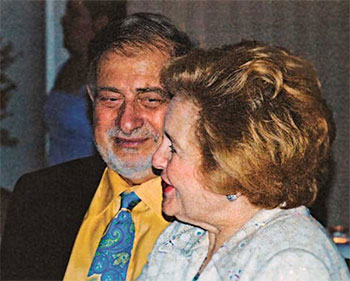
Richard and his lovely wife Beth.
How did you meet your wife, Beth?
Through friends, at the theater. I'd been divorced for eight years and Beth was a widow. She really HAD been born in the bilge of a boat, and was an entrepreneur who'd started a high-tech business. Intrigued, I asked for her number. Six months later we were engaged. That was 25 years ago.
What have been your proudest BoatUS moments?
I'd say the first was passage of that 1971 Federal Boat Safety Act, which gave the U.S. Coast Guard jurisdiction over manufacturers and made them subject to Coast Guard regulations. That was huge. Next was the passage of the Wallop-Breaux Act, which we fought hard for, that returns boaters' gas-tax money to the states to promote safe boating, build ramps, transient docks, pumpout stations, and more. Then came the repeal of the boat user fee. My hands-down proudest moment, though, was in 1989 when I announced the first Employee Stock Ownership Plan, making every employee who had worked so hard to make BoatUS successful an owner of our company. That felt great!
What is your biggest regret?
Lost years with my daughters as they were growing up. I look at them today, with their kids, and the role my sons-in-law play in raising their children. That role is a loss in my life.
What was your "big spend" when you became successful?
Beth and I established a foundation to benefit the community, and education funds for our grandchildren.
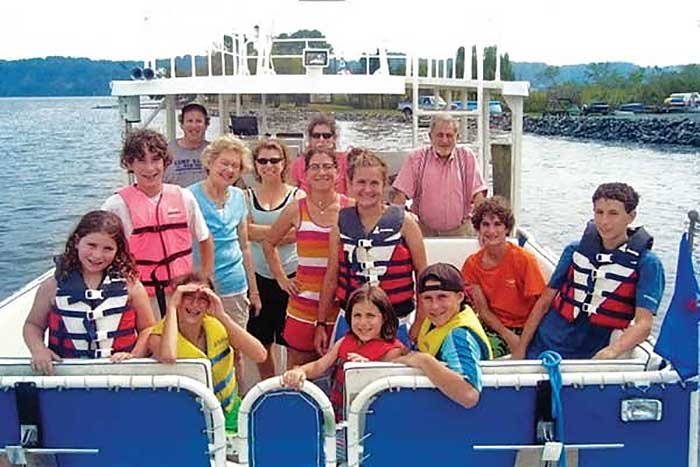
The Schwartz family is all about boating.
Boating means so much to your family. Does everyone go boating?
Boating is our way of life. Summers revolve around the water at our house on the Potomac River. Our grandchildren are put in life jackets and are on boats at 3 months old. By 2 or 3, they're "helping" on the boats. We have a 42-foot catamaran deck boat that we all go out on together, a classic 22-foot Chris-Craft outdrive with a rumble seat — that's Beth's favorite! — a 21-foot Hurricane outboard for waterskiing, a little sailing dinghy, canoe, kayak, paddleboat, and small electric boats for the grandkids. On a good weekend, they're all off the dock, and I'm content!
Even at 84, you're a night owl, out late, sending emails at all hours?
I don't get that old adage, "Early to bed, early to rise makes a man healthy, wealthy, and wise." One of the compelling reasons to start my own organization was that I hated being admonished for being late to work. Beth and I love to go out at night — to the theater, the opera, or just out for dinner with friends. I started time-shifting long before the digital age.
Your supercharged Jaguar coupe is not a typical retiree vehicle.
I think it's the best-looking car on the road. I'm taking special driving lessons from Jag to explore all the possibilities of that car.
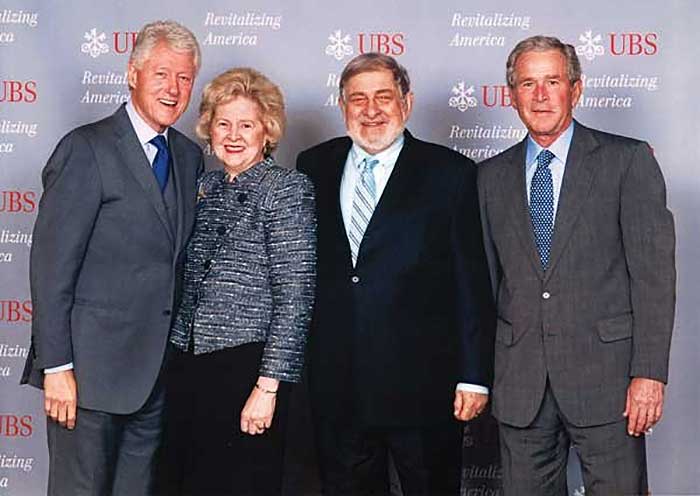
Richard and his wife, Beth Newburger, with U.S. Presidents Bill Clinton and George W. Bush. With her own communications business, Beth is active in philanthropic work and politics, and has worked as a senior political appointee for the Clinton administration.
You're retiring from BoatUS, but opening another business? Why don't you just kick back?
BoatUS is close to my heart, so I'll continue as chairman of the board, and chair of the BoatUS National Advisory Council. I do see a new business opportunity helping small technology companies work with the government. As for kicking back, well, I guess this is what kicking back looks like for me. Beth and I like to travel, and love being at full speed as long as our energy allows. We have yet to make our full contribution to this world we love.
How hard is it to retire from a company you created and nurtured for 47 years?
It's hard to imagine not heading for BoatUS every day. Although I still will have a role, I'll miss the incredible people I've worked with for so many years. You can probably guess that I've been thinking a lot about legacies lately. The good news for me is that I'm leaving BoatUS in great hands. When I started this organization, I had three goals: to make the waterways of America safer, to deliver the best services anywhere to boaters, and to reward the people who deliver that service for BoatUS. We've accomplished that. I'm a happy man.
